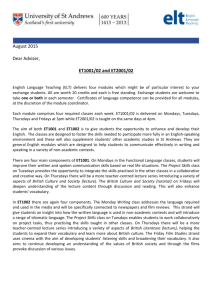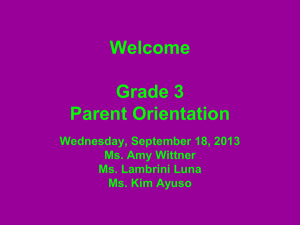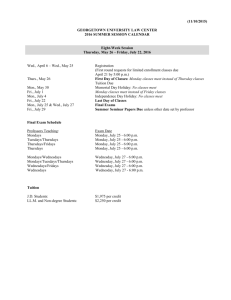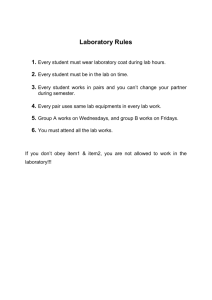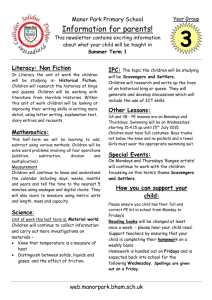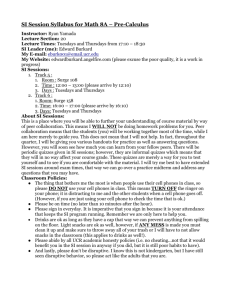News Media and the War on Terror. Professors O'Brien and Allen
advertisement
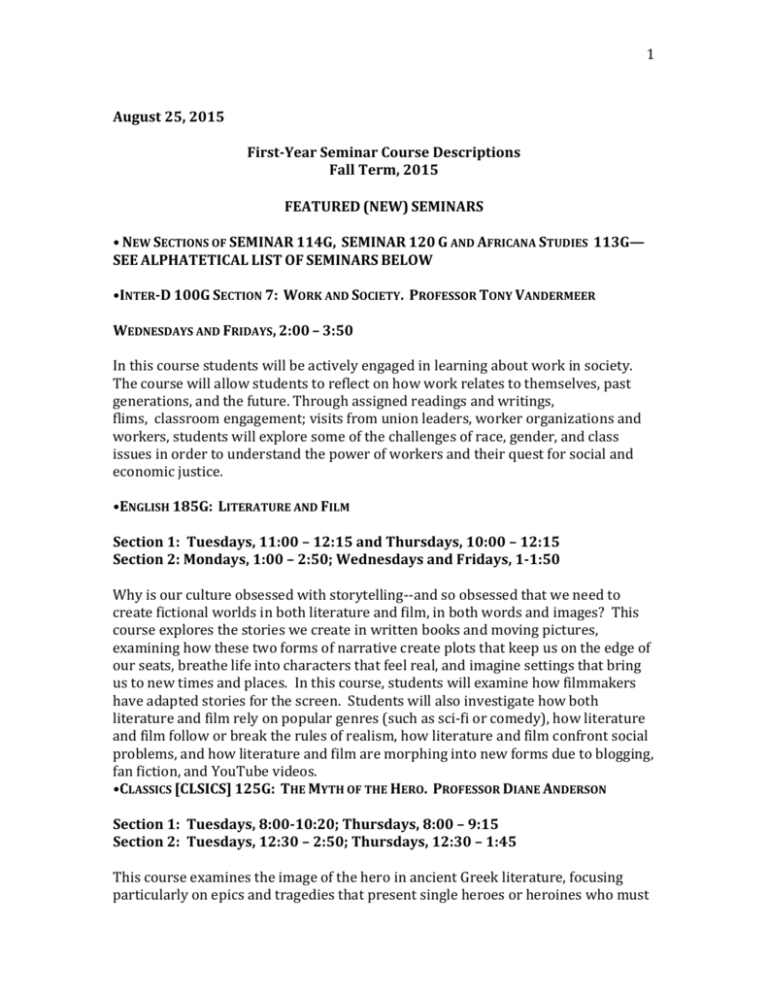
1 August 25, 2015 First-Year Seminar Course Descriptions Fall Term, 2015 FEATURED (NEW) SEMINARS • NEW SECTIONS OF SEMINAR 114G, SEMINAR 120 G AND AFRICANA STUDIES 113G— SEE ALPHATETICAL LIST OF SEMINARS BELOW •INTER-D 100G SECTION 7: WORK AND SOCIETY. PROFESSOR TONY VANDERMEER WEDNESDAYS AND FRIDAYS, 2:00 – 3:50 In this course students will be actively engaged in learning about work in society. The course will allow students to reflect on how work relates to themselves, past generations, and the future. Through assigned readings and writings, flims, classroom engagement; visits from union leaders, worker organizations and workers, students will explore some of the challenges of race, gender, and class issues in order to understand the power of workers and their quest for social and economic justice. •ENGLISH 185G: LITERATURE AND FILM Section 1: Tuesdays, 11:00 – 12:15 and Thursdays, 10:00 – 12:15 Section 2: Mondays, 1:00 – 2:50; Wednesdays and Fridays, 1-1:50 Why is our culture obsessed with storytelling--and so obsessed that we need to create fictional worlds in both literature and film, in both words and images? This course explores the stories we create in written books and moving pictures, examining how these two forms of narrative create plots that keep us on the edge of our seats, breathe life into characters that feel real, and imagine settings that bring us to new times and places. In this course, students will examine how filmmakers have adapted stories for the screen. Students will also investigate how both literature and film rely on popular genres (such as sci-fi or comedy), how literature and film follow or break the rules of realism, how literature and film confront social problems, and how literature and film are morphing into new forms due to blogging, fan fiction, and YouTube videos. •CLASSICS [CLSICS] 125G: THE MYTH OF THE HERO. PROFESSOR DIANE ANDERSON Section 1: Tuesdays, 8:00-10:20; Thursdays, 8:00 – 9:15 Section 2: Tuesdays, 12:30 – 2:50; Thursdays, 12:30 – 1:45 This course examines the image of the hero in ancient Greek literature, focusing particularly on epics and tragedies that present single heroes or heroines who must 2 undertake a journey or confront enemies. In addition to assessing various constructions of the hero, the class will consider larger questions prompted by the struggles Greek heroes faced, with themes including fate, death, failure, suffering, community values, honor, betrayal, redemption and self-discovery. •INTER-D 100G SECTION 1 PERSONAL & SOCIAL DETERMINANTS OF HEALTH: DISPARITY, EQUITY, & HEALTH PROMOTION. PROFESSOR DARIA BOENINGER Tuesdays, 11:00 - 1:20; Thursdays, 11:00 - 12:15 This course introduces biopsychosocial (combined biological, psychological, and social) understanding of health and health-related interventions, which arose in large part due to research in the field of Health Psychology. This course emphasizes consideration of equity and disparities in health, building your understanding of how and why health disparities occur across the U.S. population, how to think about ethics related to both action and inaction in the face of health inequities, and what can be done to achieve health equity. We will explore questions such as, Why do Americans, on average, experience worse health and shorter lifespans than people in other developed countries? Why do some groups of Americans experience worse health and shorter lifespans than other groups? Is health and health care a “right”?—and does every American actually have the same ability to pursue health and wellness as their fellow citizens do? What can we as a society do to reduce health disparities and promote health for every person in our country? What can we as individuals do to make sure we experience the best physical and mental health we can? •INTER-D 100G SECTION 3: SEXUALITY IN NATURE AND CULTURE. PROFESSOR TODD DROGY MONDAYS, 2:00-3:50; WEDNESDAYS AND FRIDAYS, 2:00 – 2:50 Where do our current ideas about sexuality and gender come from? How has culture shaped the way we experience love and relate to our own and others’ bodies? And— how might our own lived experiences help us to better understand and more accurately construct the meaning of human sexuality and the “performance” of gender? In this course we will conduct an inquiry across a wide range of academic disciplines, exploring diverse conceptions of sexuality & gender. The LGBTQ (lesbian/gay/bisexual/transgender/queer) community’s struggle for equal rights and recognition will be given particular attention, as we examine intersecting systems of power, knowledge, and violence. Literature and film will provide entrances into the worlds of fictional and nonfictional others; self-reflection and storytelling will help us bridge theory with our own lives. For a final project we will individually hone in on and research a current, ethical issue concerning sexuality, gender, and human well-being. •ENGLISH 189G: WAR IN LITERATURE. PROFESSOR PAUL DYSON 3 Mondays 11:00-12:50; Wednesdays and Fridays, 11:00-11:50 A study of the ways in which literary works have dealt with the problem of representing war, particularly the way in which it represents the experiences of those who participate in it. Attention will be paid to the ethical and aesthetic issues particular to the depiction of war in variety of media, such as novels, short stories, poetry and film. Although this seminar has broad appeal to a wide range of students, it has been developed with Veterans of military service particularly in mind, and will provide opportunities to bring experience in military service to the process of entering University study. To enroll in this seminar, please contact Jim McCarthy in the University Advising Office, either by email, jim.mccarthy@umb.edu, or by phone, 617-287-5724. OTHER FIRST-YEAR SEMINARS •AFRICANA STUDIES [AFRSTY] 115G: BLACK CONSCIOUSNESS. PROFESSOR TONY VAN DER MEER Section 1: Tuesdays, 3:00-4:15; Thursdays, 2:00 – 4:15 NEW Section--Section 2: Tuesdays and Thursdays, 5:20 – 6:55 This course will examine the development of Black consciousness in the 20th century. The social, economic, cultural, and political implications of Black consciousness will be explored. The impact of Ida B. Wells, W.E.B. Du Bois, Marcus Garvey, The Harlem Renaissance, The Civil Rights/Black Power movement, The Nation of Islam and The Black Arts Movement on the development of Black consciousness will also be examined. •AMERICAN STUDIES [AMSTY] 110G: U. S. SOCIETY AND CULTURE SINCE 1945. PROFESSOR CARNEY MALEY Mondays and Fridays, 1:00 – 1:50; Wednesdays 1:00 – 2:50 This course examines the multiple, and often differing ways that Americans have lived, thought, and expressed themselves from World War II to the present. Much of our country’s history has been defined by conflicts among ethnic groups and social classes about rights to economic, social, and moral well-being and even the right to call oneself an “American.” To ponder these and similar problems, scholarship in American Studies draws on an interdisciplinary approach to thinking about life in this country. Starting with World War II, but with emphasis on the historical and the 4 political context of American life since 1945, especially social class, ethnicity, race (most importantly, the African American struggle for civil rights), and work, we will use historical documents, literature, music, and movies to learn about the significant events and changes in American society since World War II and people’s responses to them. •ANTHROPOLOGY [ANTH] 112G: UNDERSTANDING HUMAN BEHAVIOR. PROFESSOR ALAN WATERS Section 1: Tuesdays, 12:30 – 2:35; Thursdays, 12:30 – 1:45 Section 2: Thursdays, 3:30 – 4:45; Thursdays, 2:30-4:45 This course examines the influence of culture on human behavior from an anthropological perspective. We focus on a number of case studies drawn from Native American, African and European contexts to consider how various aspects of culture –- religion, technology, language, social structure, etc. –- lead people to behave differently within different societies. The course readings include works of literature and history, as well as anthropological writings. During the course of the semester we consider such questions as: Why are there different cultures across the globe? How is culture related to human nature? Is it possible to understand a way of life that is truly different from one’s own? How and why do humans typically misunderstand one another across cultural lines? The purpose of the course is to provide students with an in-depth introduction to the anthropological concept of culture. •Anthropology [ANTH] 113G: Food and Society. Professor Rita Shepard Section 1: Mondays and Fridays, 8-8:50; Wednesdays, 8:00-9:50 Section 2: Mondays and Fridays, 1200-12:50; Wednesdays, 12:00-1:50 This course revolves around food - a topic that is important to all of us. Throughout the semester we will explore how food is related to culture. Discussion topics include the origins of agriculture, food taboos, the social organization of eating, festivals, and feasting. The focus of this 4 hour/4 credit seminar is food. The readings are structured around different aspects of this topic that will allow us to closely examine how food, society, and culture are interconnected. As food is something that everyone can relate to in one way or another, I anticipate the discussions throughout the semester being quite lively and thought provoking. These class discussions will be facilitated by writing assignments designed to help you focus your thoughts and through inclass group projects. In our study of food we will also learn aspects of critical thinking, careful reading, as well as how to do library and web-based research. Longer writing assignments and oral presentations will allow you to apply these skills to specific questions and data sets. 5 •Economics [ECON] 110G: Economic Ideas. Professor Jonathan Millman Section 1: Mondays 10:00 – 11:50; Wednesdays and Fridays 10:00 – 10:50 Section 2: Mondays and Fridays, Noon – 12:50; Wednesdays, 11:00 – 12:50 This first-year seminar course presents basic economic concepts and tools of analysis in the context of current economic issues. Controversies over the distribution of income, the role of markets, pollution, or globalization are often addressed, although topics vary with the instructor. Students may receive credit for only one of ECON 100, ECON 110G or ECON 112G. •English 181G, Literature and the Visual Arts. Professor Virginia Karlis Tuesdays, 12:30 – 1:45; Thursdays 11:40-1:45 In this course, we will read and discuss short stories, poetry, plays and a novel, with a theme of a journey examined in the selected works. We will pay close attention to the concept of “journey,” and how it relates to characters, social constructs and plot, as well as the consequences of choice and circumstance. To complement the selected literature, we will also study visual interpretations such as art works, movies, architecture- whatever can be identified as a visual adaptation or connection. In working with various versions and interpretations of the selected work, we will identify the differences and similarities. We will familiarize ourselves with literary devices and terminology such as genre, narrative voice and diction, and understand how our awareness of those elements contributes to our appreciation and interpretation of what we read. You will learn to talk and write about literature and be able to articulate your opinions of why a piece of writing or its visual interpretation "works" for you and why it does not. Hopefully, our study of the concept of “journey” will broaden its scope, and will apply both to the writers we study, and to you, as readers and writers on your own journey. •ENGLISH 183G: LITERATURE AND SOCIETY. PROFESSOR AVAK HASRATIAN Mondays 2:00 – 3:50; Wednesdays and Fridays, 3:00 – 3:50 An introduction to the ways in which literary works represent a particular aspect of society, such as work, education, aging, or war. Close analytical reading of literary works with special attention to a writer's social milieu and choices of form (including figurative language and representations of speech), and how readers in varying social contexts have read and used the work. •French [FRENCH] 150G: Self and Others in French Literature: The Existentialist Dilemma. Professor Dennis Gilbert Tuesdays, 9:30 – 11:50; Thursdays, 9:30 – 10:45 6 A study of individual identity within communities of other selves, through close reading and analysis of literary works by the major French existentialist writers: Jean-Paul Sartre, Simone de Beauvoir, and Albert Camus. These texts represent a broad range of moral, esthetic, and political conflicts. The essential human questions that they pose challenge students to reexamine their own education, beliefs, and actions. All readings are in English. •HISTORY 190G: WITCHCRAFT IN MEDIEVAL AND EARLY MODERN EUROPE. PROFESSOR MARYANN BRINK Mondays and Fridays, 1:00 - 1:50; Wednesdays, Noon – 1:50 Witches and witchcraft are phenomena found throughout history and throughout the world. This intensive introductory seminar revolves around the various ways the idea of witches, people who identified themselves or were identified as witches, and their practices interacted with European society at large and helped shape society, religion, law and culture from about 700 CE until 1700 CE. •HUMANITIES CENTER [HUMCTR] 100G: ART AND ACTIVISM MATTERS. PROFESSOR MARILYN FRANKENSTEIN Mondays and Wednesdays, Noon – 1:50 The study of art that does not result in making the strong less willing to oppress the weak means little. Booker T. Washington,1896 inaugural address, Brooklyn Institute of Arts and Sciences This curriculum is designed to make the study of art mean a lot, following Booker T. Washington’s philosophy to use art in the service of social justice. But, we will also be studying art that makes “the weak” less willing to be oppressed by “the strong.” In order to understand the possibilities for art to matter in social change actions, we will use an interdisciplinary approach. We will study media literacy and various political/economic frameworks through which people try to make sense of specific events in the world. We will review various ideas that groups and individuals have used to change “business as usual.” Through studying how our knowledge about the world is shaped by various media institutions (education, journalism, social media, entertainment, and public relations/advertising) we will develop ideas about how art, broadly conceived, can intervene to challenge and re-shape our perceptions and understandings. Through understanding how various events and actions can be interpreted using different political/economic frameworks, we will develop more effective interventions to provoke people’s imaginations about new possibilities for our society. We will look at art broadly, focusing on how various kinds of multi-media 7 artistic/cultural interventions make people stop and reflect, think differently, and potentially act to create more justice concerning the issue addressed. We will study a wide range of art activists, from the posters of the Billboard Liberation Front, the conceptual art of Damali Ayo and Adrian Piper and Alfredo Jaar and Hank Willis Thomas, and the YouTubes of Brave New Films, to the hip-hop music of various Palestinian groups, and the Peace Arch concerts of Paul Robeson, the political satire of such artists as Paul Mooney, Richard Pryor, and Lenny Bruce, and the performance art of Act-Up and The Yes Men and the Guerilla Girls. The artists we will study, like Paul Robeson, have “taken sides.” As Robeson argued: “The artist must take sides. He must elect to fight for freedom or slavery. I have made my choice. I had no alternative.” Hip-hop artist Talib Kweli, talks about the role of the artist in connection with his choice to support the Dream Defenders who were occupying the State House in Florida “calling on the governor to convene a special session of the legislature to enact Trayvon’s law to repeal stand your ground, ban racial profiling, and end the school-to-prison pipeline.” He quotes poet Haki Madhubuti: “The responsibility of the great artist is not to just paint a picture of what is, but to paint a picture of what could be.” •Music [MUSIC] 105G: Music of the World. Professor Frederick Stubbs Mondays and Wednesdays, 9:00 – 9:50; Fridays, 9:00 – 10:50 This course examines the power and function of music in pan-human context. Drawing on a wide variety of sounds and texts, students investigate the relationship between music and intellect, spirit, community, and environment. Special attention is given to how terms, concepts and values from various world musics illuminate and amplify our essential understanding of this human phenomenon. Please note: Students may receive credit either for this course or for MUSIC C110 (World Music), but not for both. •NURSING [NURSNG] 107G UNDERSTANDING HIV DISEASE. PROFESSORS TERI ARONOWITZ AND LEONARD ALBERTS. Section 1: Tuesdays, 8:00 – 9:15; Thursdays, 8 – 10:20 Section 2: Tuesdays, 8:00 – 10:20; Thursdays, 8 – 9:15 This course provides a comprehensive overview of HIV disease. Scientific perspectives from virology, immunology, healthcare and epidemiological literature will be presented. This will be followed by examining selected works from the humanities that examine the lived experience of persons with HIV disease. Finally, the relationship between HIV disease and society will be examined, including social, cultural, economic, policy, and moral/ethical issues. Focus will be on integration of multiple perspectives in order to develop a comprehensive understanding of HIV. 8 •PHILOSOPHY [PHIL] 109G: MORAL DEBATE IN SOCIETY. PROFESSOR ROMA FARION Section 1: Mondays and Fridays, 10:00 – 10:50; Wednesdays, 9:00 – 10:50 Section 2: Monday and Fridays, 2:00 – 2:50; Wednesdays, 1:00 – 2:50 This course will study some contemporary problems of social ethics, particularly abortion; the death penalty; pornography, hate speech, and censorship; and world hunger and poverty. We will study varied positions on these issues, and the justifications that have been offered to support them. The course will develop the ability of each student to clearly articulate her position in each of these controversies, and to defend it persuasively, both in speaking, and particularly in writing. •PHILOSOPHY [PHIL] 110G: EQUALITY AND JUSTICE. PROFESSOR ROBERT ROSENFELD Section 1: Mondays and Wednesdays, 3:30 – 5:15 Section 2: Mondays and Wednesdays, 7:00 – 8:45 This course examines several forms of inequality: oppression and exclusion based on race and gender; the differences between born and unborn humans, and between humans and non-human animals; and inequality in access to social goods such as health care. Participants examine issues of moral inclusion, justice and rights that underlie these inequalities. •PHILOSOPHY [PHIL] 130G: PRIVACY. PROFESSOR DAVID FLESCHE Section 1: Mondays, 8:00 - 9:50; Wednesdays and Fridays, 8:00 – 8:50 Section 2: Mondays, 1-2:50; Wednesdays and Fridays, 1:00 – 1:50 Section 3: Tuesdays, 12:30 – 2:50; Thursdays, 12:30 – 1:45 This course examines several of the current threats to privacy in the computer age related to drug testing, the assembling of personal information dossiers, genetic screening, privacy on the internet, medical records, and workplace concerns. It makes use of philosophical legal, and privacy rights. This course may count toward the major in philosophy. •SEMINAR [SEMNR] 114G: INVESTIGATIONS ACROSS THE CURRICULUM. THIS COURSE IS OFFERED IN SEVERAL SECTIONS AND THREE DIFFERENT VERSIONS. REALITY AND THE AMERICAS. PROFESSOR MEESH MCCARTHY 9 SEMINAR 114G SECTION 1: REALITY AND THE AMERICAS. Tuesdays, 9:30 – 11:50, and Tuesdays, 9:30- 10:45 Professor McCarthy Reality and the Americas examines how reality and fantasy are understood and constructed by, across, and in the Americas. We will use materials drawn from across the curriculum (e.g., from history, psychology, and media and communication studies) to develop our definitions of reality, fact, truth, fiction, fantasy, myth, virtual space, and reality-television. The course begins by relying on Howard Zinn's A People's History of the United States, which allows us to explore how we view the past and reality. As students develop their arguments about how categories such as reality and fantasy differ and overlap, we will ask questions such as: How do definitions of reality/fantasy change as we shift from the humanities to the physical/social sciences? Is there a distinct or a blurred boundary between reality and non-reality (during, for example, online social networking)? As we explore relationships between reality and the Americas, students will work on the seven capabilities that all First Year Seminar courses introduce to their students. Like other First Year Seminars, this is a four-credit course that meets four hours per week. You will be expected to think, rethink, and then to challenge or change your premises and think again. You will be expected to focus and to help your classmates to do so in classroom, computer lab, and library settings. At the end of the course, students will complete an independent project that connects the course themes to their own interests. Past projects have included student-imagined and student-developed portions of websites, mass mailers, video games, newspapers, and academic journals. Enrollment by Placement. NEWS MEDIA AND THE WAR ON TERROR. PROFESSORS O’BRIEN AND ALLEN NEW SECTION--Seminar 114G Section 3 - Mondays and Wednesdays 10:00-10:50 and Fridays 8:00-8:50. Professor Allen SEMINAR 114G SECTION 4 TU/TH 12: 30-1:45 AND TH 2:00-2:50 PROF. O'BRIEN NEW SECTION--Seminar 114G Section 6 - Mondays 800-9:50; Wednesdays and Fridays 8:00-8:50 Professor Allen News Media and the War on Terror revolves around 1) the academic capabilities 2) course content and themes 3) our ongoing collaboration. The Academic Capabilities are the primary tools of investigation, presentation and collaboration: careful reading, critical thinking, clear writing, teamwork, academic self-assessment, information literacy and speaking-listening. Content: The 9-11-01 attacks ushered in a new war: the “Global War on Terror” (GWOT). Like other U.S. wars the White House had to “sell” this to the public. The news media played a pivotal role in the buying, selling and rejecting of the GWOT “sales pitch”. 10 We use three basic claims of “frame theory”: (1) all humans frame, (represent), reality; (2) all frames are selective; ( 3) therefore frames are unavoidable distortions (Schudson, 2011). We pose such questions as: if all frames are distorted, are some ‘better’ than others? How are frames always distortions, but not always lies? What are the obligations around framing of the President, the Press and the Public during times of national crisis? Above all, students are expected to actively contribute to the development of this course, and take responsibility for their learning and academic performance. These expectations call for you to take risks, reflect and become comfortable with the challenges associated with independent problem-solving, decision making, and scholarly collaboration. Enrollment by Placement. COURT CASES - PROFESSOR RADDATZ NEW SECTION--SEMINR 114G Section 2 MWF 9:00-9:50 W-1-63 and W 10:00-10:50 W-1-031 Prof. Raddatz NEW SECTION--SEMINR G114 Section 5 T/TH 9:30-10:45 M-1-418 and Th 8:3010:45 Prof. Raddatz This First Year Seminar is about arguments, in particular legal and related arguments that are used in courtrooms. We will study courtrooms, in real criminal, civil, and constitutional cases, as documented on film and in court transcripts, where you will observe the words and actions of individual jurors, judges, prosecutors, and defense attorneys. These cases represent both just and unjust outcomes. In some cases, the criminal evidence for guilt may be ambiguous. In some, the judicial system may be inherently biased because of a particular judge or lawyer, or because of the constraints of the appeals process or the ways the justice system is funded. And in other cases, the system seems to protect our rights well. Come judge for yourself. Enrollment by Placement. •SEMINAR [SEMNR] 120G: MIND-BODY CONNECTIONS. PROFESSOR BRYAN WILLIAMS Section 1: Mondays and Wednesdays, 2:00 – 3:45 Section 2: Mondays and Wednesdays, 1:00 – 1:50; Fridays, 12:00-1:50 Section 3: Mondays and Fridays, 11:00 – 11:50; Wednesdays, 10:00-11:50 How do the body and mind interact? We will investigate this question through observations of ourselves, through observations and interviews of others, and 11 through the course’s readings and library research. Along the way we will learn about how people deal with physical and emotional challenges and how some people seem more resilient while others may become more resilient. For assignments there will be journal entries, formal essays, and frequent presentations, often in groups. Once or more each week, meditation and/or physical exercise will be required as well. The exercises will be adaptable to short- or long-term physical limitations. •SEMINAR [SEMNR] 125G: DEFINING FREEDOM. PROFESSORS MICHAEL LEBLANC AND POLLY WELSH. Section 1: Tuesdays and Thursdays, 2:00 – 3:45 Section 2: Tuesdays, 8:00 – 9:15; Thursdays, 8:00 – 10:15 Section 3: Mondays and Fridays, 2:00 – 2:50; Wednesdays, 2:00 – 3:50 Section 4: Mondays and Friday, 8:00 – 8:50; Wednesdays, 8:00 – 9:50 By examining the issues of race, class, and gender, participants look at what freedom has meant to different people in the United States. They are also asked to reflect on and write about their personal definitions of freedom and to broaden and deepen the understanding they bring to their own historical situations. Enrollment by Placement. •SEMINAR [SEMNR] 126G: AGING AND WISDOM. PROFESSORS THEODORA CHOCOS AND LORENA FUENTES LOPEZ Section 2: Tuesdays, 8:00 – 9:15; and Thursdays, 8:00 – 10:20 Section 3: Tuesdays, 12:30 – 1:45; and Thursdays, 12:30 – 2:50 We will examine varied historical, cross-cultural, and literary views on aging and wisdom. Through a wide range of texts and genres, a visit to a nursing home, and an interview with an octogenarian, we will take an in-depth look at the way individuals, societies and families deal with and view the elderly, death, and dying. We will analyze the causes and effects of these attitudes and how they relate to social and political expectations, policies, and changes. Enrollment by Placement. •SOCIOLOGY [SOCIOL] 110G: INSIDERS/OUTSIDERS. PROFESSOR ANNA BECKWITH AND DANIEL FINN Section 1: Mondays, 9:00 – 10:50; Wednesdays and Fridays, 10:00-10:50 Section 2: Tuesdays, 8:00 – 10:20; and Thursdays, 8:00 – 9:15 12 Section 3: Tuesdays, 11:00 – 12:15; and Thursdays, 10:00 – 12:15 What often makes it possible to justify and practice oppression is the division of groups of people into outsiders/insiders based on their gender, “race”/ethnicity, class, age, sexuality, religion, nationality, belief, ability, or others. Such “Us” vs. “Them” dualisms give oppressors the justification to organize social (economic, cultural, political) structures and interactions in such a way that the free development of their own creative powers comes at the expense of preventing others from developing the same in themselves. Central to what makes insider/outsider mentality and divisions possible is the deeper dualism of self vs. society. The central purpose of this course is to go beyond such an insider/outsider mentality and lifestyle by developing our sociological imaginations, a way of looking at the world and ourselves that helps us understand how our personal troubles and larger public issues have shaped and influenced one another, and can in turn shape and influence one another in non-oppressive ways. Using a variety of readings augmented by selected films, in this course we will explore how sociology can help us understand how society works itself out in our everyday lives, and how we can become better persons and help create better societies, thereby pursuing what a liberal arts education promises to do: to help individuals freely develop their creative powers and seek the same for others in the world. Student assignments will consist of engaged attendance and participation in discussions, shared reports and presentations, and a term paper developed in multiple drafts, cultivating students' critical sociological imaginations by exploring the link between their personal troubles and ever globalizing public issues. •SOCIOLOGY [SOCIOL] 120G: SOCIOLOGY OF POPULAR CULTURE. PROFESSORS DANIEL FINN AND MATTHEW GREGORY Section 1: Mondays, 2:00 – 3:50; Wednesday and Fridays, 3:05 – 3:55 Section 2: Tuesdays, 1:50 – 3:55; Thursdays, 1:50 – 3:05 What is popular culture? How do mass media and popular culture help us to make sense of our world, identities, and relationships? Do we organize our lives around media or do media shape our lives? Do media technologies make us happier or better citizens in a democratic society? This course will address such questions by applying various theoretical lenses to artifacts and visual messages in media and popular culture, with a primary emphasis on developing a critical awareness of contemporary mass media (radio, film, photography, music, television, fashion, video games, the internet) and their impact on culture. You will examine your own conceptions and consumption of media through (1) readings and group tasks that engage and challenge your perspective on our cultural landscape, (2) a service-learning project 13 that integrates the local community with your understanding of course material, and (3) writing assignments that allow you to apply the theories and concepts you learn to your own analysis of popular culture. Access to a camera is required. Note: Section 50 is reserved for Navitas Program students. 14 Women and Gender Studies [WGS] 120G: Women and Men in Families. Professor Lynne Benson Tuesday, 12:30 – 1:45; Thursdays, 11:30 – 1:45 Has feminism destroyed the traditional family? Would marriages last longer if women and men shared family responsibilities equally? Does society still need to make major changes if we want both women's rights and stable families? Participants read, discuss, debate, and make up their own minds on these issues. This course may count toward the major and the minor in women's studies.
